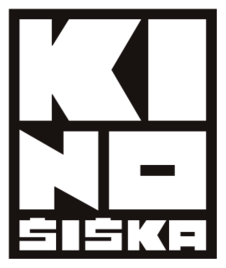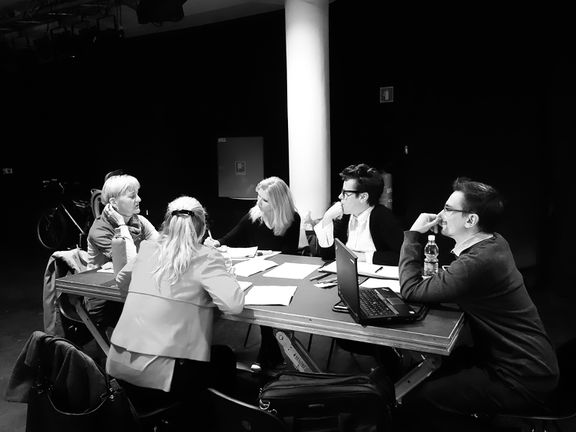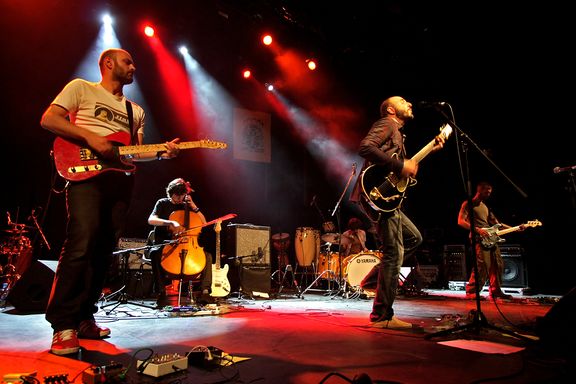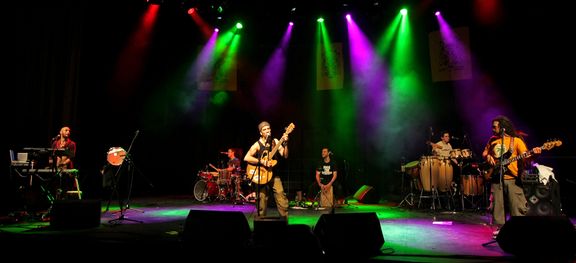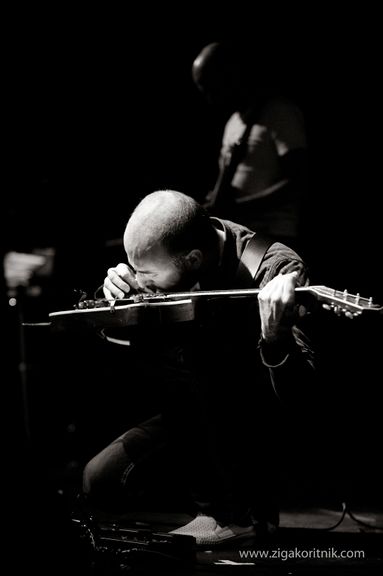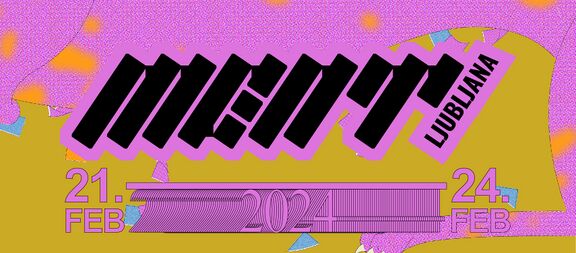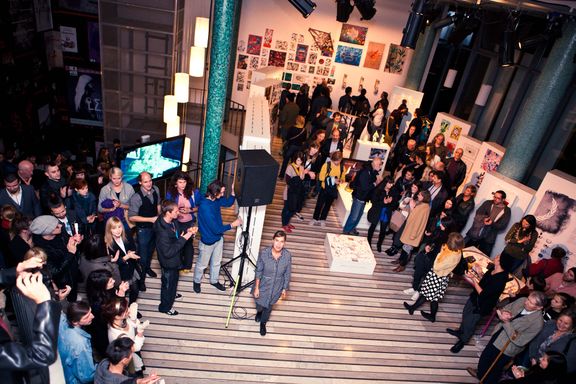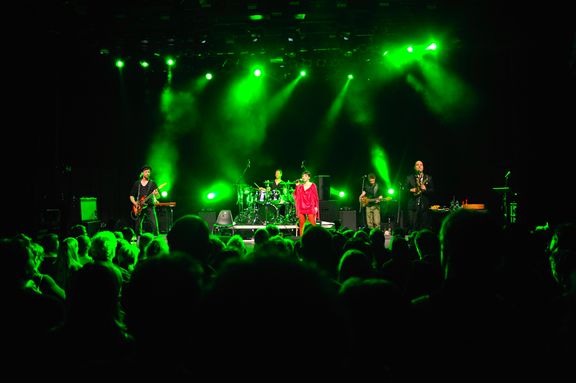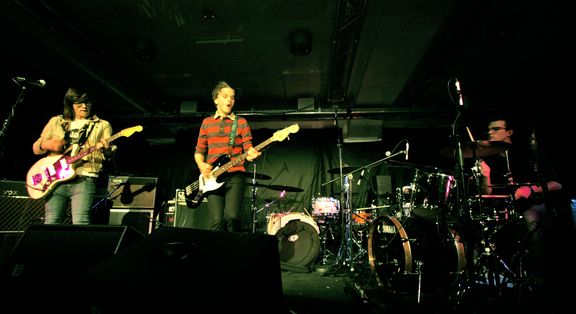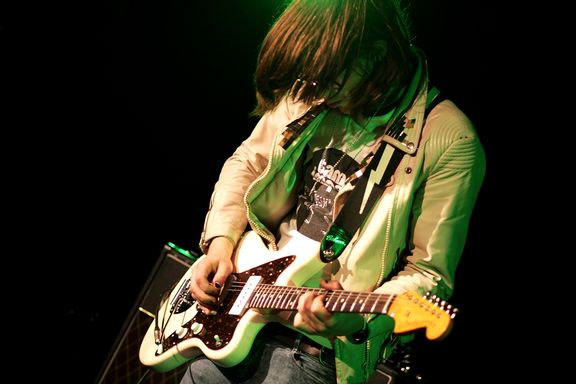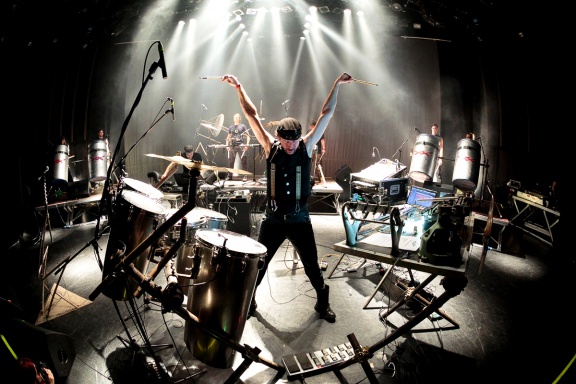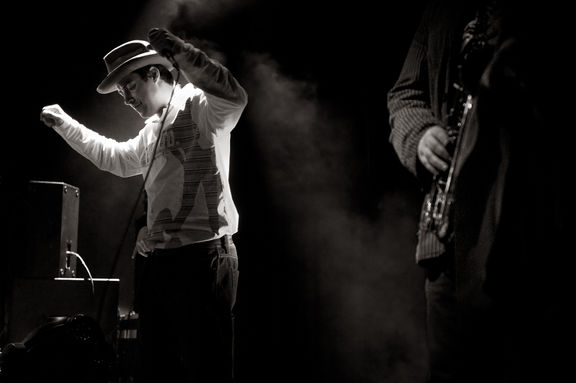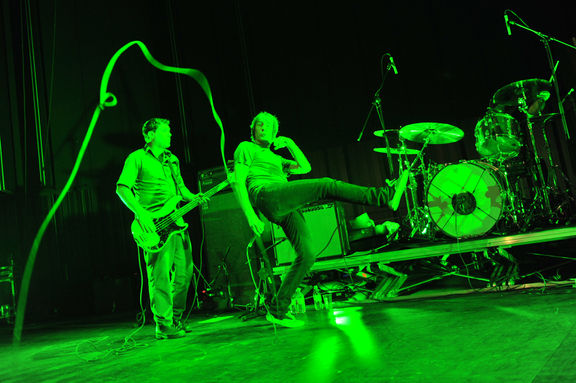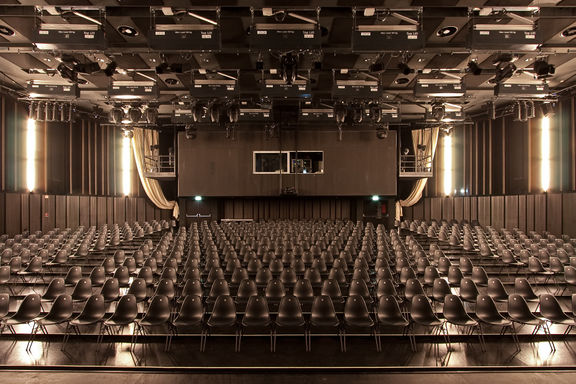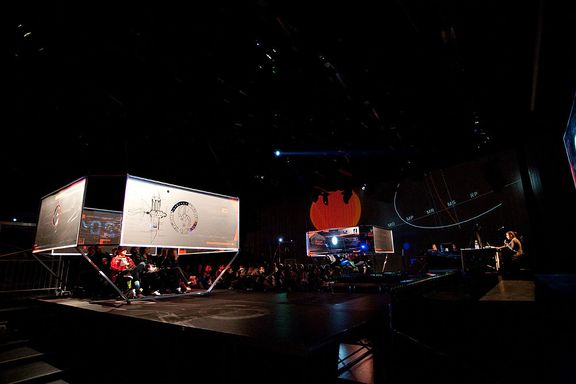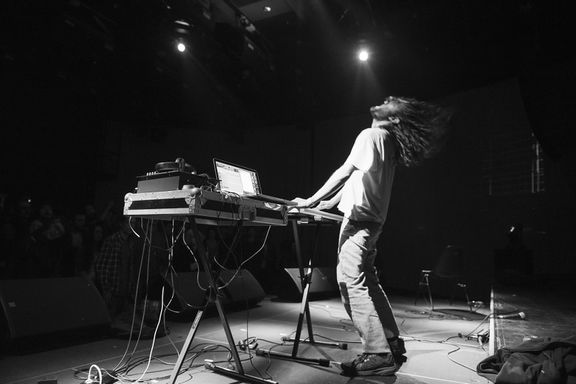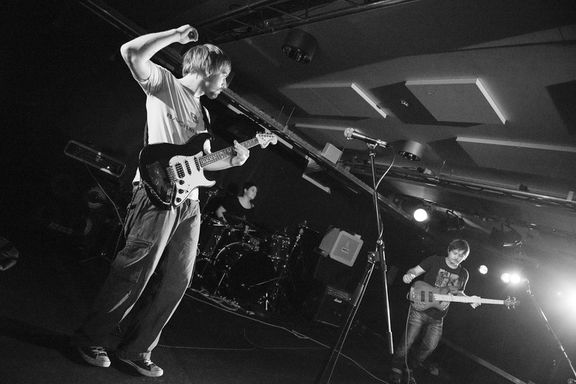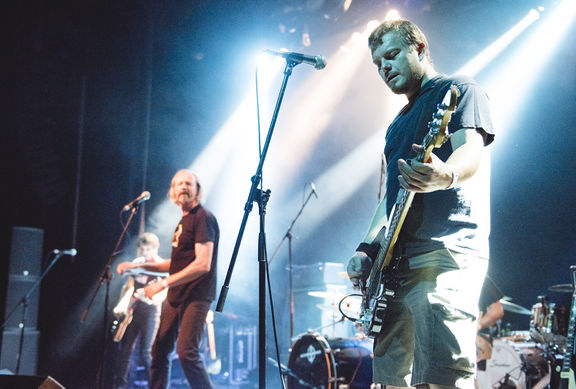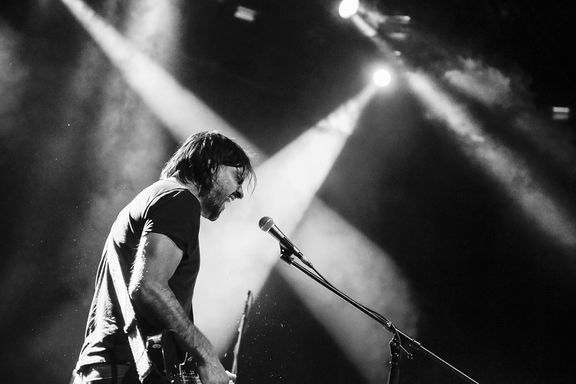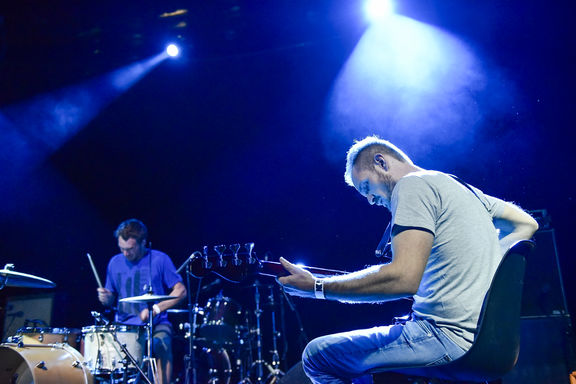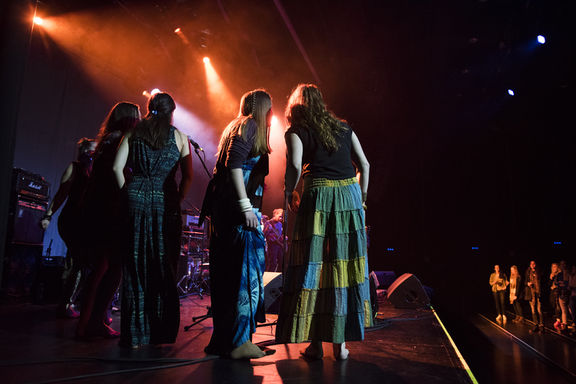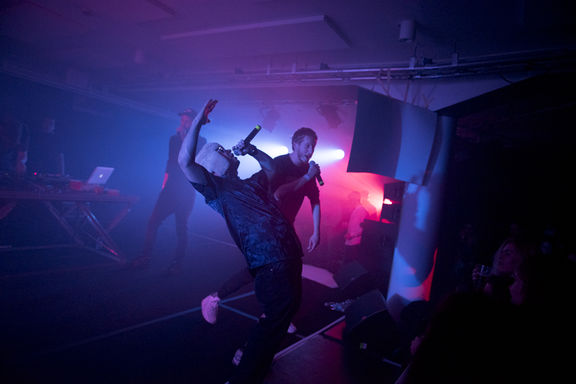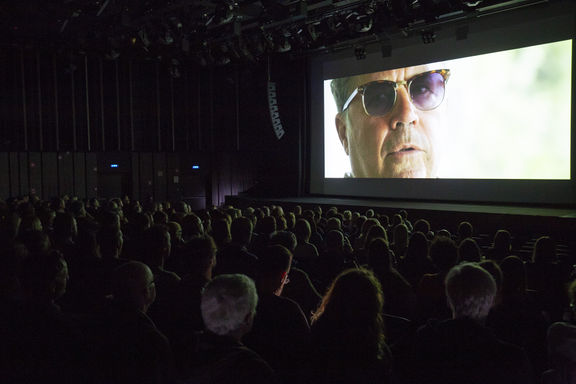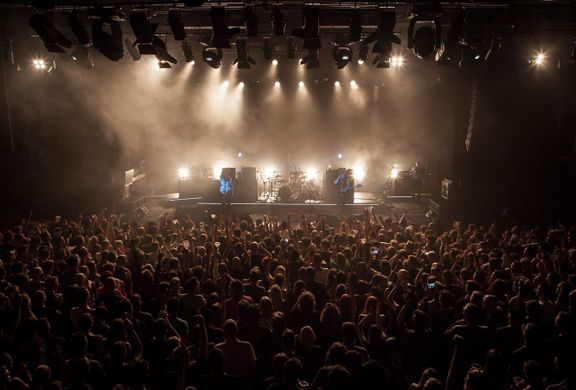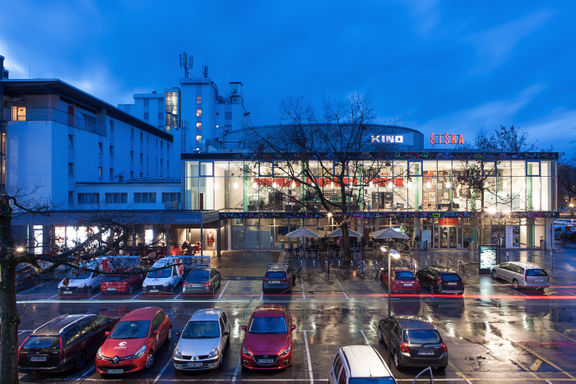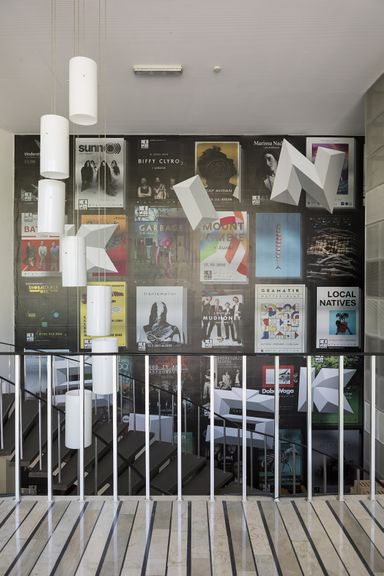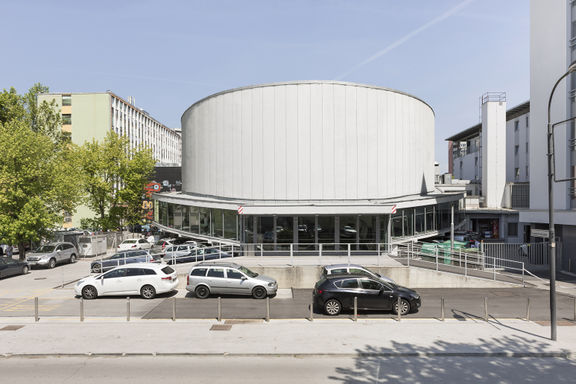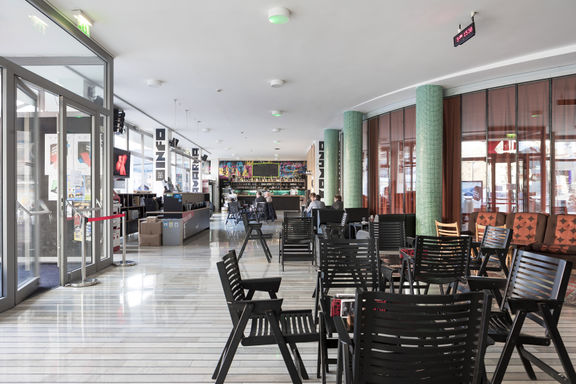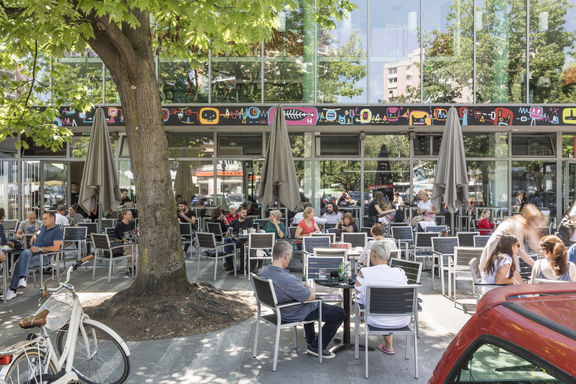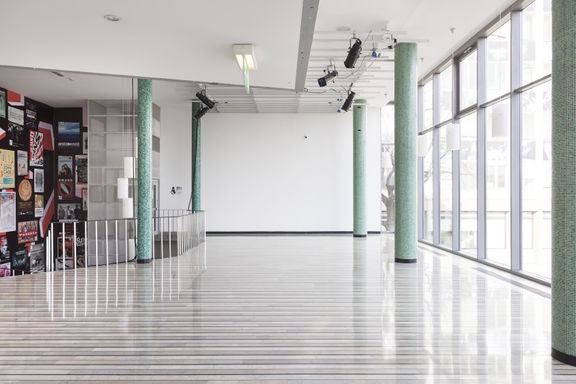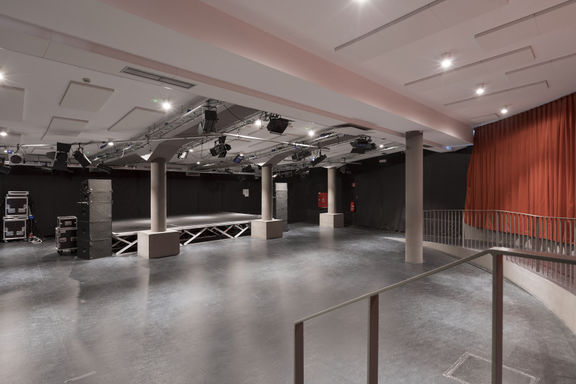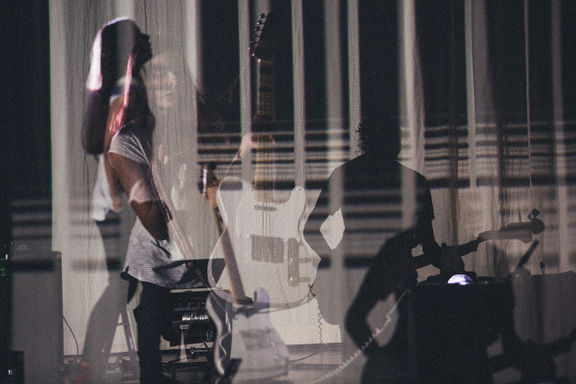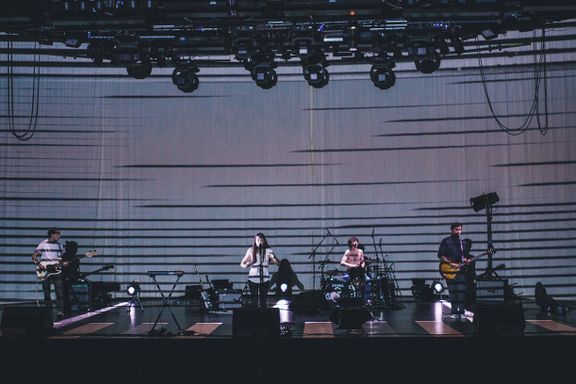Difference between revisions of "Kino Šiška Centre for Urban Culture"
Anže Zorman (talk | contribs) (Finished) |
Anže Zorman (talk | contribs) (new logo (looks same as previous, but who am i to argue)) |
||
| Line 6: | Line 6: | ||
| name = Kino Šiška Centre for Urban Culture | | name = Kino Šiška Centre for Urban Culture | ||
| local name = Center urbane kulture Kino Šiška | | local name = Center urbane kulture Kino Šiška | ||
| − | | logo = Kino Siska Centre for Urban Culture (logo).svg | + | | logo = Kino Siska Centre for Urban Culture new 2017 (logo).svg.svg |
| street = Trg prekomorskih brigad 3 | | street = Trg prekomorskih brigad 3 | ||
| town = SI-1000 Ljubljana | | town = SI-1000 Ljubljana | ||
Revision as of 08:34, 18 July 2017
-
18 Jun 2024
A performance of "Inside the Outside", a collaboration between the artists of Nomad Dance Academy Slovenia and the acclaimed American dancer and choreographer Deborah Hay. Produced by Nomad Dance Academy Slovenia, Bunker Institute, Kino Šiška Centre for Urban Culture, and DUM Association of Artists.
-
19 Jan 2024
A concert by Sahareya, in collaboration of Trieste Film Festival, Kino Šiška Centre for Urban Culture and Hangar Teatri.
at the Trieste Film Festival
-
11 Oct 2018
ALIEN EXPress: 2nd Flight, a dance performance by Žigan Krajnčan and Gašper Kunšek, produced by Flota Institute and Kino Šiška Centre for Urban Culture,
at the Festival of Creation
-
to
27 Sep 2018
28 Sep 2018
Futurski, Haiku Garden and Bowrain via INES#talent, Innovation Network of European Showcases, in cooperation with the MENT Ljubljana Festival, Kino Šiška Centre for Urban Culture and SIGIC, Slovene Music Information Centre, supported by the Slovenian Culture and Information Centre, Vienna (SKICA) (Embassy of the Republic of Slovenia Vienna),
at the Waves Vienna Music Showcase Festival and Conference
-
13 Sep 2018
Odilo. Obscuration. Oratorio. by Dragan Živadinov and Peter Mlakar, produced by Mladinsko Theatre and Kino Šiška Centre for Urban Culture,
at the Belgrade International Theatre Festival BITEF
-
to
28 Sep 2017
30 Sep 2017
Slovenian moMENTs with Persons from porlock, Daniel Vezoja and КУКЛА in cooperation with the MENT Ljubljana Festival, Kino Šiška Centre for Urban Culture and SIGIC, Slovene Music Information Centre, supported by the Slovenian Culture and Information Centre, Vienna (SKICA), Embassy of the Republic of Slovenia Vienna,
at the Waves Vienna Music Showcase Festival and Conference
-
11 May 2017
Metamorphoses 3°: Rhetoric by Bara Kolenc and Atej Tutta, produced by KUD Samosvoj Cultural Association, and co-produced by Kino Šiška Centre for Urban Culture, KUD Pozitiv Cultural Association and Plesna izba - Maribor Dance Room, supported by the Slovenian Culture and Information Centre, Vienna (SKICA), Embassy of the Republic of Slovenia Vienna,
-
to
3 Feb 2017
24 Feb 2017
The Slovenian Independent Biennial, an exhibition of contemporary Slovenian graphic illustration, organised by the Independent Biennial, supported by Kino Šiška Centre for Urban Culture and the Embassy of the Republic of Slovenia Washington,
-
to
5 Jan 2017
27 Jan 2017
The Slovenian Independent Biennial, an exhibition of contemporary Slovenian graphic illustration, supported by Kino Šiška Centre for Urban Culture and the Embassy of the Republic of Slovenia Washington,
-
16 Dec 2016
Different Worlds, an exhibition featuring works by Lana Bregar, Jaka Bulc and Tina Umer, produced by Photon Gallery in cooperation with the Kino Šiška Centre for Urban Culture, and supported by the Slovenian Culture and Information Centre, Vienna (SKICA), Embassy of the Republic of Slovenia Vienna, accompanied by a musical performance by vocalist Katja Šulc and DJ teoP (White Trash),
-
to
25 Nov 2016
26 Nov 2016
A MENTprizent tour of Koala Voice, Čao Portorož and Blaž in cooperation with the MENT Ljubljana Festival, Kino Šiška Centre for Urban Culture and SIGIC, Slovene Music Information Centre at the PIN Music Conference and
at the Taksirat Festival
-
to
29 Sep 2016
1 Oct 2016
Slovenian moMENTs with The Canyon Observer, Karmakoma and Jardier in cooperation with the MENT Ljubljana Festival, Kino Šiška Centre for Urban Culture and SIGIC, Slovene Music Information Centre, supported by the Slovenian Culture and Information Centre, Vienna (SKICA), Embassy of the Republic of Slovenia Vienna,
at the Waves Vienna Music Showcase Festival and Conference
-
to
13 Aug 2016
14 Aug 2016
Performances Kam pa kam, produced by Kino Šiška Centre for Urban Culture and GVRbabaLAN and co-produced by Bunker Institute, and I am a performer by Sabrina Železnik at POP UP AKTO
-
18 May 2016
Metamorphoses 3°: Rhetoric by Bara Kolenc and Atej Tutta, produced by KUD Samosvoj Cultural Association, and co-produced by Kino Šiška Centre for Urban Culture, KUD Pozitiv Cultural Association and Plesna izba - Maribor Dance Room, at the 53rd Theatertreffen
-
to
24 Sep 2014
25 Sep 2014
All Together Now!, by Mare Bulc and performers, produced by Maska Institute and co-produced by Bunker Institute and Exodos Institute, Škrip Inc., produced by Maska Institute and co-produced by Kino Šiška Centre for Urban Culture and in cooperation with Bunker Institute, and Pavla above the Precipice, produced by Mladinsko Theatre, at the 39th International Theatre Festival MOT
-
to
3 Oct 2013
6 Oct 2013
Coma Stereo, Ian Green, It's Everyone Else, Kill Kenny, Milk Drinkers, New Wave Syria, N'toko, Toronto Drug Bust and Werefox. Presentation of Slovenia as a guest country was organised by SIGIC, Slovene Music Information Centre in cooperation with the Slovenian Music Week, and Kino Šiška Centre for Urban Culture, Slovenian Culture and Information Centre, Vienna (SKICA) (Embassy of the Republic of Slovenia Vienna),
at the Waves Vienna Music Showcase Festival and Conference
Creed
Legally Kino Šiška is a public institution. It is an organiser, producer and co-producer of various events, but above all it functions as a programme manager and mediator between numerous concert organisers, booking agents, independent producers, artists – and also the demands and needs of the audiences.
The venue
Kino Šiška has two well equipped and adaptable multi-functional halls: the large Katedrala Hall, which can hold about 900 standing visitors standing for music concerts, and the small Komuna Hall, accommodating up to 200 souls. The lobby in front of the Katedrala Hall serves as a flexible exhibition space and is named Kamera. The café is a popular hangout for the Šiška Cultural Quarter, with the yard in front of it also occasionally serving as a venue.
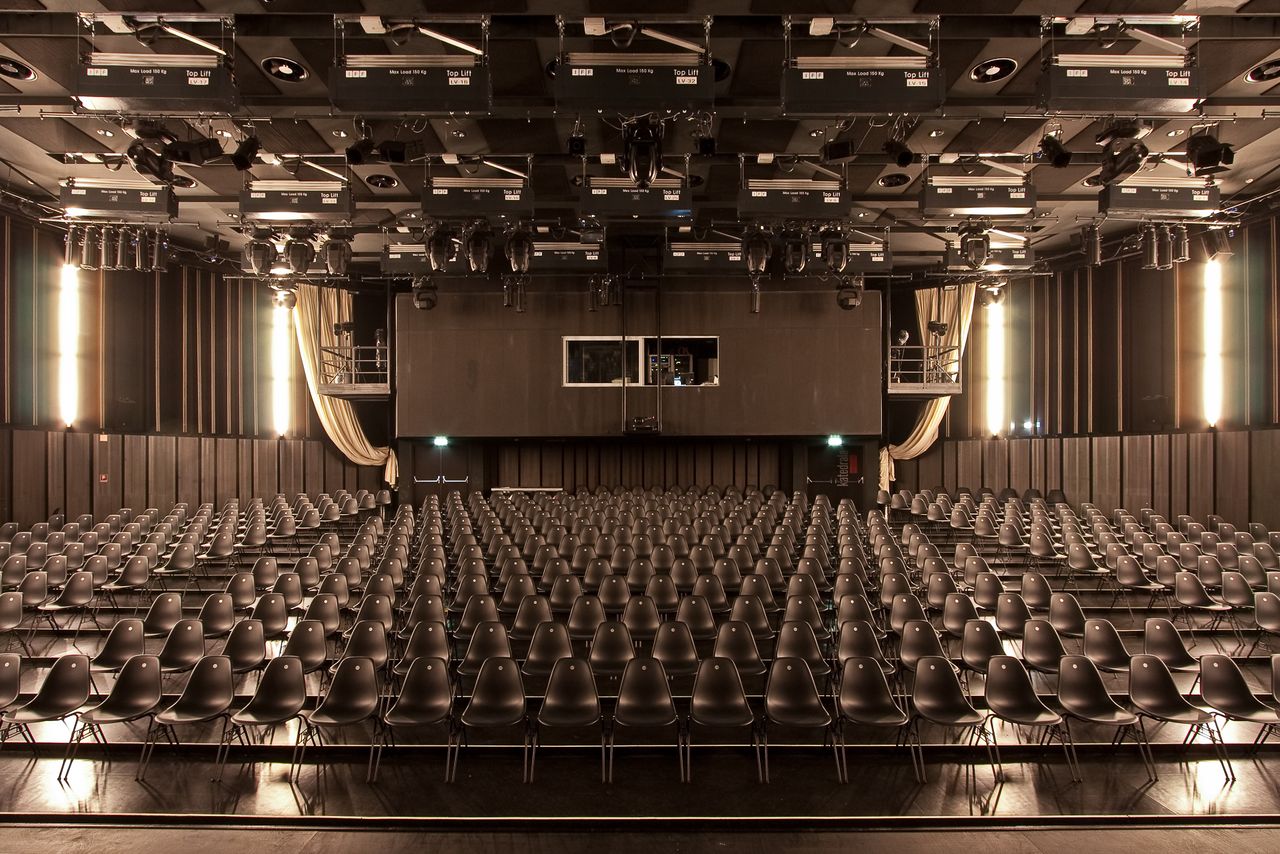 One of two technically equipped and adaptable multi-functional halls: the large Katedrala Hall can hold from 800 to 1000 visitors standing for music concerts, Kino Šiška Centre for Urban Culture
One of two technically equipped and adaptable multi-functional halls: the large Katedrala Hall can hold from 800 to 1000 visitors standing for music concerts, Kino Šiška Centre for Urban Culture
Background
The name of the centre means Cinema Šiška, with Šiška being the name of its respective Ljubljana neighbourhood. It is inherited from the building in which it is stationed, a cinema built in 1961 as one of the first Ljubljana buildings characterised by modernist architecture (work of the Slovene architect Božidar Gvardjančič). In 2001 the cinema closed its doors for good and was afterwards but sporadically used for various art projects, dance and theatre performances, workshops, and so on.
However, after many years of public debates, civil initiatives and postponed public construction plans, the building was thoroughly renovated and the Kino Šiška Centre for Urban Culture was finally established by the Municipality of Ljubljana. It represents the biggest municipal financial investment into Ljubljana cultural infrastructure in decades.
Music programme coordinates
Music concerts are the main pursuit of Kino Šiška. The programme is very broad, though it does usually steer clear of the more mainstream productions. Indie, alternative, explorative, progressive and experimental expressions are its trade, even when talking about pop music.
It organises the highly renowned MENT Ljubljana international conference and showcase, sets up a cycle of primary and high school band concerts called Špil Liga, and partly co-produces a number of festivals, among them being the Druga Godba Festival and the Sonica International Festival of Transitory Art. It occasionally also sets up concerts outside its walls, as for example at the summer auditorium Križanke or at festivals across the country. A number of outside producers regularly use the premises of Kino Šiška, among them the national radio Val 202 and the rock promoter Kataman.
With a special policy concerning their guest list (even the accredited pay a symbolic fee nonetheless), KŠ annually finances a music project of its choice.
Hosted artists
Some of the musicians that have graced the stage of Kino Šiška (or been brought to Slovenia by it) are The Swans, Mulatu Astatke, Die Antwoord, Gramatik, The Pixies, Queens of the Stone Age, The Kooks, Editors, Ghostface Killah, Tindersticks, Haloween, Mike Stern, Future Islands, Asaf Avidan, Tricky, Nils Frahm, Alva Noto, Godspeed! You Black Emperor, Dirty Three, The Tiger Lillies, Jan Garbarek, John Spencer Blues Explosion, The Necks, GoGo Penguin, The Jesus and Mary Chain, John McLaughlin, Oren Ambarchi, Trentmoller, Anna Calvi, Satyricon, Lamb of God, Laibach, Random Logic, Noctiferia, and so on.
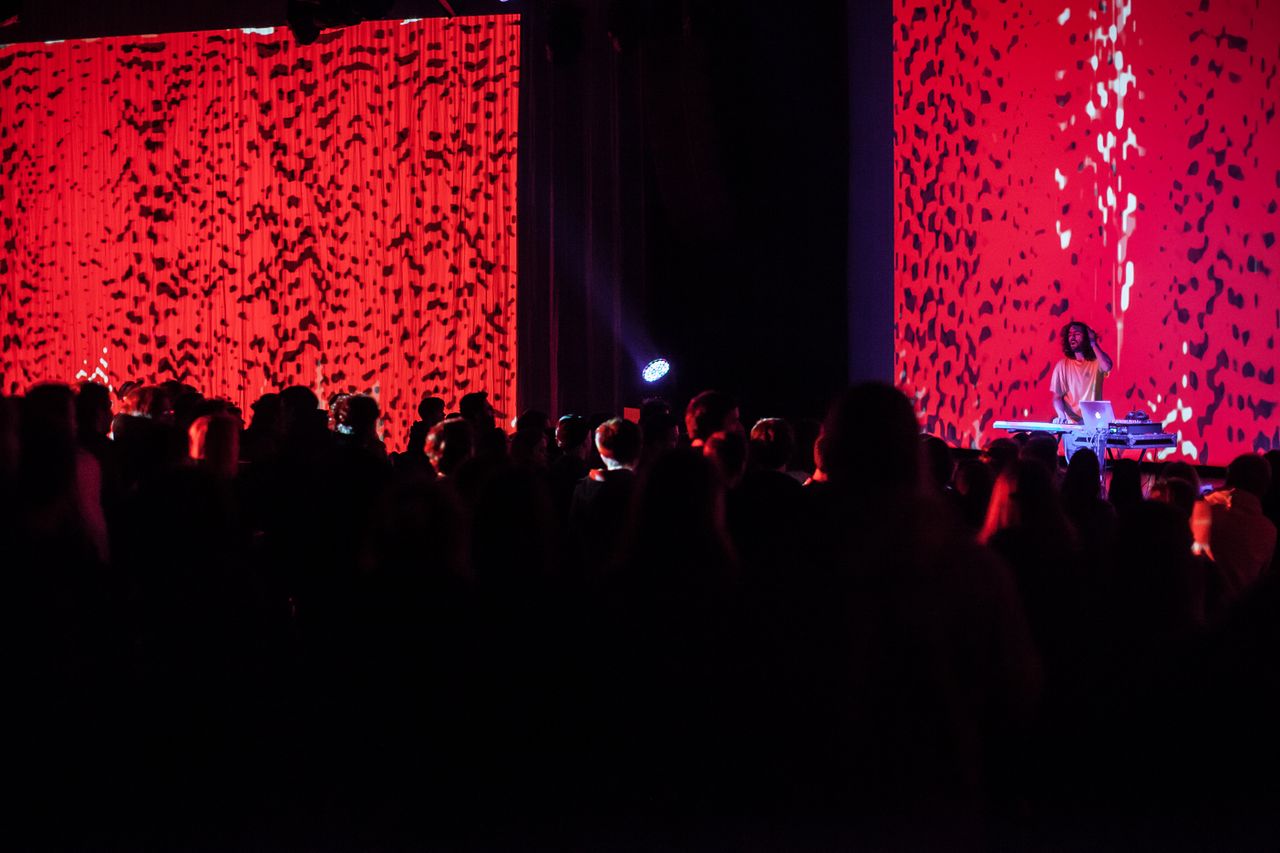 Blaž performing on the big stage of Kino Šiška Centre for Urban Culture at TRESK Festival, 2016
Blaž performing on the big stage of Kino Šiška Centre for Urban Culture at TRESK Festival, 2016
Art and design programme
Kino Šiška leads the visual arts sales gallery DobraVaga, set in the city centre and especially focused on young artists. It is in a way a continuation of the year long and rather packed Kino Šiška's art programme that forefronts young new media artists, illustrators, designers, comic authors, and others. Comics are in fact wuite a thing here, and for many years the place aserved as a comic book shop. Now it hosts the comics focused Stripolis festival as well as a regular 'comics bazaar'.
Some of the events hosted or co-produced by Šiška (as sometimes called by the locals) are the Independent Biennial, the Blind Date Convention, Festival of the Artist’s Book, and the Design Biotop. Other similar festivals very often also at least partly use the venue's infrastructure.
It should be mentioned that as Šiška for a time co-produced the Slovenia Coworking programme, it is also the predecessor and godfather to the Poligon Creative Centre co-working space.
Theatre, dance, and film programme
Many a new documentary or feature film by Slovene authors gets to have its premiere at this former cinema, and its hall is a regular host for the Ljubljana International Film Festival.
As for theatre, it can be probably said that mostly it is the more experimental and often technologically elaborate productions that are being hosted here. Relatively frequent are, for example, works by Dragan Živadinov, of the Delak Institute. Contemporary dance is also integrated into Kino Šiška's horizon and the annual CoFestival is one of bigger such enterprises in Slovenia.
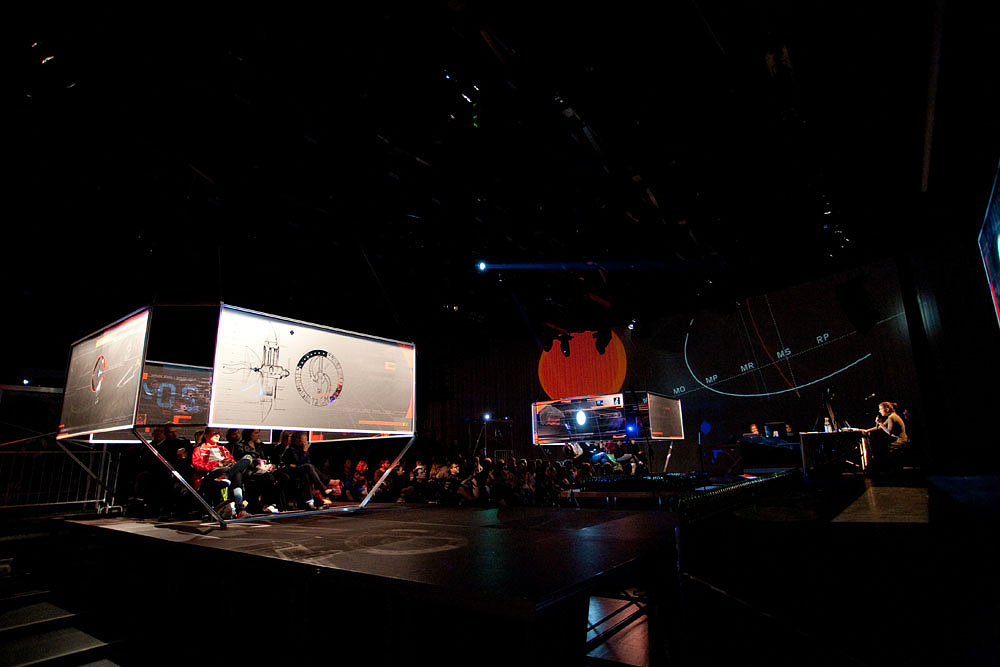 Postgravity art 'informance' by the Delak Institute, whose main mission is the culturalisation of space, enabling the merging of art and science in real space. Kino Šiška Centre for Urban Culture, 2010
Postgravity art 'informance' by the Delak Institute, whose main mission is the culturalisation of space, enabling the merging of art and science in real space. Kino Šiška Centre for Urban Culture, 2010
International cooperation
Kino Šiška Centre for Urban Culture is regularly operating in and through various European networks, and platforms, among them European Dancehouse Network, Liveurope, Trans Europe Halles, etc. It participates in various EU funded projects, among them Quantum Music (exploring the connection between music and quantum physics) and [modul-dance] (supporting the development and mobility of dance artists).
A fairly recent (2017) such project is called Innovation Network of European Showcases, realised together with about ten other partners (the leader of the project is GET a GIG GmbH (DE).
See also
Kino Šiška productions
Some of the hosted festivals and producers
- TRESK Festival
- Druga Godba Festival
- Sonica International Festival of Transitory Art
- Ljubljana International Film Festival (LIFFe)
- Independent Biennial
- Blind Date Convention, Festival of the Artist’s Book
- Kataman - Association for Artistic Production
- ŠKUC Buba Booking and Promotion
- Delak Institute
- Cona Institute
External links
- Kino Šiška website
- modul-dance website
- music webiste
- Nomad Dance Academy website
- MENT Ljubljana website
- DobraVaga website
Gallery
- Producers
- Venues
- Cultural centres
- Concert halls
- Exhibition venues
- Event organisers
- Exhibition organisers
- Music
- Music venues
- Visual arts
- Visual arts venues
- New media art
- New media art venues
- Dance
- Dance venues
- Dance producers
- Theatre
- Theatre event organisers
- Theatre venues
- Theatre producers
- Cafés
- Šiška Cultural Quarter
- EU funding of Slovene organisations (Culture and MEDIA Programmes)
- EU Culture funding recipient
- EU Creative Europe, Culture funding recipient



